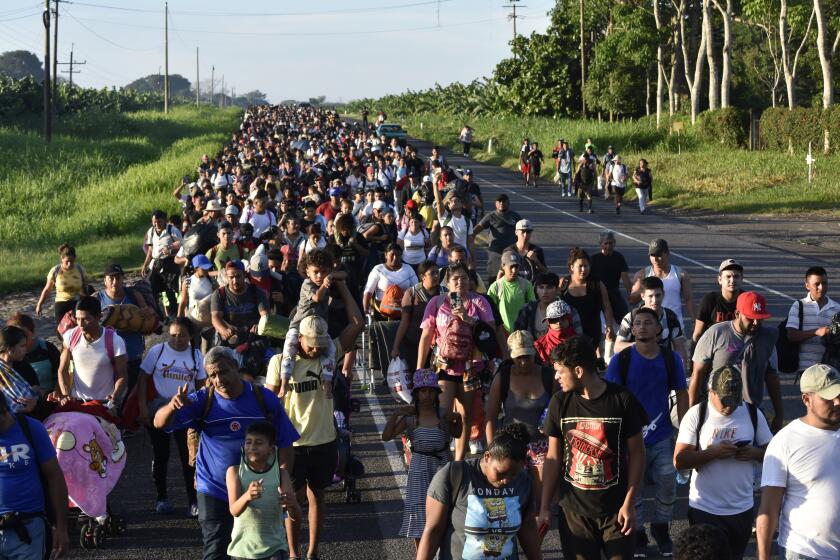Pre-holiday blast kills 9 in Baqubah
A suicide bomber killed at least nine people Thursday outside a Shiite mosque in the Iraqi city of Baqubah during the run-up to the Islamic sect’s major religious holiday, police said.
The attacker detonated his explosives as worshipers were making evening preparations for the festival of Ashura, which falls on Saturday. Police said 14 people were wounded in the blast.
The attack in the capital of Diyala province came a day after a female suicide bomber struck in the nearby town of Khan Bani Saad, killing eight people.
A witness to Thursday’s blast said he watched a stranger arguing with a police officer who had been searching people entering the area by the mosque.
“I saw the bomber explode like a balloon with my own eyes,” said Nussaif Jasim, a cafe owner. “It was so fast, something unbelievable. Many people were outside the mosque. Many were harmed, even children.
“The policeman was torn to pieces,” Jasim said.
Sunni extremists targeted Ashura celebrations in 2004, with suicide bombings killing about 180 people in attacks in Karbala and at the Shiite shrine of Kadhimiya in Baghdad.
For this year’s Ashura, the government has put a vehicle ban in effect, with some exemptions, in Baghdad and much of central Iraq in hope of staving off large-scale attacks against Shiite pilgrims.
On Ashura, the 10th day of the Muslim month of Muharram, Shiites mourn the death of Imam Hussein, a grandson of the prophet Muhammad. Hussein and his followers were slaughtered in 680 on the plains of Karbala by the forces of Islamic ruler Yazid. Hussein’s martyrdom and the death of his father, Ali, before him were the root of the schism between Sunni and Shiite Islam.
The celebrations for Ashura, in which hundreds of thousands flock to Karbala to mourn Hussein’s death and reenact his last battle, have become symbolic of the ascendancy of Iraq’s Shiite majority. Shiites were restricted in celebrations of their faith under Saddam Hussein’s Sunni-dominated regime.
Diyala province, with its mixed Sunni-Shiite population, has been a magnet for sectarian violence. Many Sunni militants who fled Baghdad in the face of a U.S. military crackdown last year are believed to have taken refuge in Diyala, to the north and east.
Red, black and green flags were aloft across Shiite areas of Iraq as the faithful prepared for Ashura. At the Kadhimiya shrine, the scene of the violence in western Baghdad on Ashura four years ago, Iraqi army troops and police officers had sealed off streets to protect the thousands of pilgrims who will celebrate this year’s festival there.
Many Shiites observe the holiday by beating drums and lashing their chests with chains, in memory of the death centuries ago.
Meanwhile, U.S. Air Force B-1 bombers dropped 34,000 pounds of munitions Thursday on two bunkers that the military said were used for training Al Qaeda in Iraq recruits. The strikes occurred in Arab Jabour, a sparsely populated farming community just south of Baghdad, where the military dropped nearly 50,000 pounds of munitions in airstrikes last week.
No one was believed to be in the bunkers.
Two 500-pound bombs also razed two houses that the Army said had been rigged with explosives southwest of Arab Jabour.
Elsewhere, two women and a male civilian were killed Thursday during two U.S. raids in a follow-up to sweeps last week in the Diyala River valley, aimed at driving Sunni militants from their sanctuaries, the U.S. military said in a statement. A clash with militants erupted in the town of Jalula when U.S. soldiers raided a building.
The Americans called in an airstrike and the shootout left three militants and two women dead, the military said. Two other women were wounded and treated by U.S. medics, it said.
In the same area, a male civilian apparently panicked when U.S. soldiers asked residents to leave a building. He started to walk toward the Americans but ignored warning fire and was fatally shot by U.S. soldiers, the military said. No weapons were discovered on him.
The military said it regretted the civilian deaths.
--
Times staff writers Caesar Ahmed and Saif Hameed contributed to this report.
More to Read
Sign up for Essential California
The most important California stories and recommendations in your inbox every morning.
You may occasionally receive promotional content from the Los Angeles Times.






